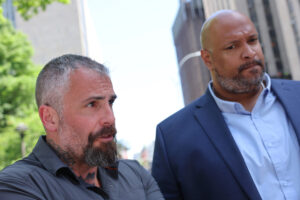5:00
News Story
Two seats on Henderson Justice Court in play for primary election
An open seat on the Henderson Justice Court has attracted half a dozen attorneys, including several who previously ran for the position, while in another department, a candidate appointed to the bench late last year faces a lone challenger.
Department 1
Six candidates are vying to fill the vacancy in Henderson Justice Court Dept. 1, resulting from the departure of former Justice Sam Bateman, who left to become the deputy manager of Clark County. The court hears both civil and criminal matters.
“I’ve been doing this for almost 25 years,” Sandra Allred DiGiacomo said during a phone interview of her career as a prosecutor, including a long stint with the Clark County District Attorney’s office. “I think it’s just a perfect next step. I love the city and have dedicated my career to public service and I want to continue that on the bench.”
In 2013, she won the primary race for Henderson Municipal Court, but was defeated in the general election.
DiGiacomo raised just under $28,000 in the first quarter and has about $12,000 on hand.
So far, she says, she’s “just gone to family and friends” to raise money. “It’s just the way our system is, and unfortunately, to be able to campaign effectively you have to raise money.”
Judicial elections and appointments “each have their own issues,” she says. “Honestly, I don’t think one is better than the other because it depends on who appoints. Political party stuff can come into it, even though it’s nonpartisan.”
DiGiacomo says she can “easily dispel” the notion that she may bring prosecutorial bias to the bench.
“As a prosecutor, my job is not to win. You don’t just look at your case. You have to look at the other side for negotiation. You have to look into the defendant’s background, addiction issues, what they do for a living. I have to consider both sides and try to come up with something that’s fair for both and would be considered justice.”
She says individualized bail hearings, required by the Nevada Supreme Court in its Valdez Jimenez ruling, are a “good idea, but I think the way they’re forcing hearings to happen so quickly hurts both sides, especially defendants,” she says, referencing the requirement that bail hearings be held within 48 hours of arrest. “It doesn’t give time to pull the defendant’s records and there’s no legislative funding to accommodate the process by hiring extra clerks and prosecutors.” .
DiGiacomo has mixed feelings about remote court hearings, which have become permanent since their inception during the pandemic.
“For a status check or setting a new date, it’s fine. But if you’re going to do any sort of argument, sentencing, motion work, I personally think it’s better to have parties in court,” she said, adding the technology can be cumbersome.
Henderson resident Harvey Gruber is making his second run for Dept. 1, after losing in 2016. He says he’s likely the only candidate who has handled all of the court matters that may come before Henderson Justice Court.
Gruber has practiced law for 27 years, taking on both civil and criminal cases.
“In Henderson Justice Court, I have represented people on temporary protective orders. for small claims matters, for evictions, and for criminal stuff. The job is probably two-thirds civil and one-third criminal.”
He says he understands the reasoning behind the mandate for individualized bail hearings.
“It makes sense that you shouldn’t be punished if you don’t have any funds to bail out. The problem I had with the decision is that it didn’t delineate specific guidelines for judges to follow.
There wasn’t any guidance that came down from the Supreme Court. They said ‘do a hearing and if there are any reasons that you should put bail on, you can.’ I appreciate what they’re doing. I’m sure bail bondsmen can’t stand it because it’s cutting into their business.”
Gruber says he’s all for remote hearings for appropriate matters. “Obviously you can’t do a trial. You can’t do a preliminary hearing that way. But you can do a status check.”
Gruber says as a member of the State Bar’s ethics commission, he’s worked “to weed out the bad attorneys to protect the public.” He says the Bar “tends to go after the little fish rather than the bigger fish, just because it’s easier that way.”
As stewards of the Bar’s client security fund, ethics commissioners strove “to give back money to clients who have been defrauded by attorneys who had been disbarred or suspended. That was very rewarding.”
In the first quarter, Gruber reports raising $1,500 ($1,000 in a loan from himself) and has $1,045 remaining.
He says he “absolutely” prefers the appointment process and retention elections to electing judges, although he notes “there are pitfalls with everything. With some appointments you’ve got to be juiced in, politically.”
Todd Prall says he’s always wanted to run for judge but liked most of the incumbents. The open seat in Dept. 1 gives him the opportunity he’s sought to “give back to my community.”
“I think I have the right temperament to be a judge,” he said during a phone interview. “And I feel like I’m a good attorney. I know how to advocate for clients. But I feel like in my heart that real asset would be on the bench.”
Prall says his practice is mostly civil cases “from homeowners association disputes to collections actions. I do mostly landlord-tenant work. I represent a lot of landlords and I have done some work on the tenant side.”
He says he thinks he could be fair to tenants facing eviction.
“I’ve often felt that when you’re representing one side, you have to represent both. That’s your job. You have to act on their interests,” he said. “And there are many times when I totally get where tenants are coming from. And honestly, as a landlord, most of my clients are interested in keeping tenants who can pay their rent and if there’s problems they want to solve them so that they can continue to pay their rent.”
He says he’s worked with “a lot of tenants who are representing themselves and it kind of opened my eyes to different parts of the practice, and I’m interested in making sure both tenants and landlords have access to the justice system.”
Prall says judges “do an okay job of making sure litigants who are representing themselves know how the system works, but I think there’s more to be done on that. I can’t do that from the bench but I can work behind the scenes and make sure our courts educate people better and help them understand.”
He says he’s often able to resolve cases without going to trial. “Or even when the trial starts, after it goes for a little bit.”
Prall, a senior attorney with Hutchison and Steffen, has raised just over $19,000 and has about $6,700 remaining.
“I would prefer that we appointed judges,” he says. “Frankly, the biggest issue I have is the idea that a sitting judge has to think about running again. It might affect the way they make decisions because they know the main people in town who support them. Although it’s not going to completely change their decisions or they’re not going to suddenly become corrupt, it may have an unintended effect. They may be reticent to take on certain people or certain groups of people. I think that can be an issue that prevents them from being impartial.”
Deputy public defender Marla Renteria is a native Northern Nevadan who moved to Las Vegas to earn her law degree at Boyd School of Law.
Renteria canceled an interview with the Current and did not reschedule by press time.
According to her website, she has ten years of experience as a public defender. She has advocated for diversity among Nevada’s lawyers, writing in 2013 that “since 2010, Hispanics have comprised more than 25 percent of Nevada’s population, but only slightly more than 3 percent of Nevada’s lawyers are Hispanic.”
“For over ten years I have been protecting the constitutional rights and dignity of the most vulnerable people in our community,” says Renteria’s judicial questionnaire. “I have extensive litigation experience in Justice Court, and some of the most important work I do is working with the District Attorney to create solutions that address the root causes of criminal conduct to help individuals through their counseling and treatment so they can transition back into productive members of society.”
She raised $32,906 in the first quarter and has $27,466 remaining.
Louis Schneider says winning a seat on the bench would be “a third career for me.”
Schneider says he had “a very large leasing company” until the dot-com stocks “came crashing down and I couldn’t put the fires out fast enough.”
He landed in law school at the age of 40 and says he never excelled in school until then.
He partnered early in his career with Jeanne Winkler, an attorney who embezzled from the firm’s trust account. “I called the state bar and turned her in. She ended up in prison.”
Schneider has his own history of disciplinary actions. “Yeah, I’ve been disciplined I think three times and it’s usually stupid things that my staff ended up doing but I’ve never stolen anybody’s money.”
State Bar records indicate Schneider has been reprimanded twice – once for failing to deposit all unearned fees into a trust account. “None of these transactions resulted in client or third-party harm,” the Bar wrote in the letter of reprimand.
A second letter of reprimand, filed in 2020, says a client paid Schneider $500 for legal services in a child custody matter.
The client “claimed that you agreed to draft a motion for modification of child custody, file it in Family Court and pay filing fees, and then attend the court hearing.”
Schneider maintained he would “never file a motion and litigate her matter in court for that amount of money” and only agreed to give her legal advice. But emails from a staff member indicated the firm was working on a motion.
Schneider says most of his experience is in criminal practice, but added he has some civil experience, such as Family Law.
“I think I can help many more people on the bench than I can as an individual attorney and I enjoy that. I like helping people and I don’t think everybody needs to go to prison. It’s expensive to jail people,” he said, adding he’s “never understood why the city of Las Vegas will lock up homeless people for six months for jaywalking, when it costs $150 a day warehousing. It just doesn’t make sense.”
Schneider says he’d rely on diversion programs for defendants who require drug and mental health treatment. “Those things make a difference. And I think that money is much better spent than warehousing the city jail to keep them off the streets.
Schneider says he’s a fan of remote appearances. “I think it makes a lot of sense. It’s one of the few good things that came out of COVID. We can handle a higher volume of cases more efficiently because of video appearances.”
The downside, he says, is that “people are more lax and tend to be more disrespectful to the court. But I think the pros substantially outweigh the cons. I definitely prefer trials in person. There’s no question that something is lost in the translation.”
Schneider’s campaign contribution and expense form says he’s raised no money and spent about $2,500.
“I hate it,” he says of soliciting contributions. “I haven’t asked anybody for money. I just have a hard time asking people for money and I really think that a better system would be judges appointed by the governor and then a retention election.”
Gary Thompson is a native of Henderson, where his father served as a police officer.
“I’m involved with the Henderson Chamber and the city. I’ve been an alternate judge for eight years in Henderson and two years with the City of Las Vegas. He ran unsuccessfully for the Henderson Municipal Court in 2013.
“Most of my work as an attorney is in civil litigation and injury cases. I’ve done a lot of traffic tickets. It’s one of the first things I did when I started,” he says, but has experience in criminal defense including DUIs, protection order violations, stalking, reckless driving, and hit and runs.
Thompson raised about $20,000 in the first quarter and has approximately $9,000 on hand.
“I do a lot of charity work. I find it’s a lot easier to ask for money for a cause than it is to say ‘hey, contribute to my campaign.’ It’s definitely a necessary evil.”
Thompson favors remote hearings, noting it negates the requirement that he charge clients for driving time to rural courts.
He says individualized bail hearings require finding a balance between setting reasonable bail and ensuring public safety. “It’s a tough balance to strike. So I think it’s reasonable for us to sit down as judges to hear all the facts up front, rather than imposing a cookie cutter bail across the board.”
Department 3
Justice of the Peace Barbara Schifalacqua was born and raised in Milwaukee, Wisconsin, and attended Chicago-Kent College of Law.
Schifalacqua was a prosecutor with the Clark County District Attorney for more than 15 years. She’s also been a hearing master in Family Court, where she handled temporary protective orders and domestic violence orders. She ran unsuccessfully for District Court in 2020. .
Schifalacqua handles civil and criminal matters in Henderson Justice Court. She was appointed to the position last year by the Clark County Commission to replace Judge David Gibson, who retired. She has endorsements from the Henderson Police Officers Association, the Clark County District Attorneys Association, and other major law enforcement organizations.
She has had no issues adapting to the Supreme Court’s ruling on individualized bail hearings “In my former role as a prosecutor, we always argued for the least restrictive means to keep the community safe and to ensure the defendant’s return to court, so I don’t know that I have a particular opinion. It’s something that should be done.”
Many of the litigants in Justice Court appear without an attorney. Schifalacqua says she takes the time “for people to understand what’s going on. Pro se litigants are bound by the rules and procedures, but I can take time to explain myself when they don’t quite understand what’s going on.”
Schifalacqua says she favors video appearances “depending on the nature of the hearing,” and reserves them primarily for status checks.
She has raised about $35,000 and has approximately $25,000 on hand.
Her opponent, Patricia Doyle, is a Clark County public defender, according to her judicial questionnaire.
According to her judicial questionnaire, Doyle, who grew up in Henderson, received her law degree at UNLV in 2009, and has worked as a public defender since 2011.
“Justice should be blind and administered fairly and without regard to a person’s social status, economic means or political affiliation,” Doyle wrote in her questionnaire.
She has raised no money and has no expenses, according to her campaign finance report for the first quarter. Doyle did not respond to the Current’s requests for an interview.
Another candidate, Greg Denue, says he has suspended his campaign.
Our stories may be republished online or in print under Creative Commons license CC BY-NC-ND 4.0. We ask that you edit only for style or to shorten, provide proper attribution and link to our website. AP and Getty images may not be republished. Please see our republishing guidelines for use of any other photos and graphics.




